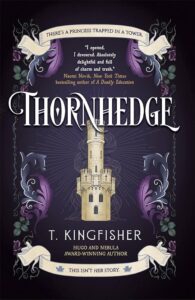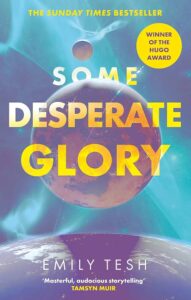When I read for the Hugos, I like to write a full review for each novel and novella that I finish, but I also like to finish all of my reviews from a given calendar year by the end of that year, and so here I am. There’s not a whole lot of December left, and the backlog is large by my standards. Time for some short takes.
In Thornhedge, T. Kingfisher retells Sleeping Beauty from the point of view of a fairy whose task is to guard the hedge. It’s not a demanding task, which is good, because she spends much of the year nearly hibernating in frog form, happily ensconced in the muck at the base of the thorns. Kingfisher moves the story back and forth through time, inviting readers to consider reasons other than malice why Beauty might be left asleep and unattended. All is well and good for a long time, especially once trade routes change and Beauty’s castle is nearly forgotten. The fairy is relieved that fewer knights come to test their mettle against the thorns; she was generally sad to see them lose, but not sad enough to keep them from losing. And then one day, many many years later a knight arrives who is more interested in the story, and in the fairy. He is a Muslim and a scholar, a younger son of whom not much is expected. He and the fairy like each other, help each other, and so naturally things start to go awry. It’s unfair to say that I liked Nettle & Bone, the other Kingfisher story I’ve read recently, better — one has the full space of a novel to open out, the other is a novella; one is constrained by the tale it retells, the other has fairytale antecedents but gives free rein to Kingfisher’s preferences — but I did. Considered on its own, Thornhedge is charming but a bit distant. I liked the knight’s family background: it gives him a different motivation, a different perspective. When the knight and the fairy — sometimes in frog form but mostly in young-woman form — start to have their adventure, they’re an amiable and companionable pair, with the traditional roles considerably diluted, and when they flow back it’s mostly to comic effect. The ending is tense, and satisfying. Thornhedge was a splendid way to spend some reading time. (Doreen’s review of Thornhedge is here; she liked it lots.)
In the end, I gave my top vote for novella to Rose/House by Arkady Martine, though I am not at all sure it was more enjoyable than Thornhedge. I liked the ambitious strangeness of the story. I liked how Martine considered personal and artistic obsession, how they can be both creative and destructive, and how she told that story in a way that was more than just artists suffering for their art. I liked how told a story of how apprenticeship can easily slide into culthood, particularly in professions where notions of genius play an outsize role. In a nearish future in which modern civilization has partly shaken apart, someone has died inside a house that’s also an architectural monument, the final work of groundbreaking, rich, eccentric, famous builder. Not incidentally, the house is also an AI. Only one living person — the late architect’s estranged star pupil — has access to the house, and that only under certain circumstances. Local police call the pupil back to help unravel the mystery; she confronts the house, her past, the looming influence of her mentor as she tries to piece together what has happened. This is a story of atmosphere; the setting and setup will not stand up to too much consideration. For example, the house refuses entrance to the police; I suspect that in reality that if the authorities had a warrant, they would just blow the fucking door off, who cares what the house says, AI or no. I don’t remember how the mystery turned out, but I do remember how evocative Rose/House was, and I still relish that feeling. (Doreen’s review is here; she was not keen.)
Witch King is as solid as the other two fantasies by Martha Wells that I have read to date, and more ambitious. The story begins with Kai awakening unexpectedly, “floating to the surface of a soft world of water.” (p. 1) Readers experience the world through Kai’s perceptions, and it is a while before these become anything less than terribly confusing. He has a telepathic link to Ziede, though Wells waits to clue readers in on who she is and why the two of them should be linked through “a drop of his blood hardened into a red pearl buried in her heart,” (p. 1) or indeed how such a thing should work. Gradually, his perceptions expand and parts of his memory return, revealing that he is a demon, borrowing a mortal body, and he had been imprisoned by powers unknown in a coffin in water, the one element to which he is vulnerable. Half of Witch King tells how Kai came to this pass, and the other half moves forward from Kai’s awakening, through his escape with Ziede and onto their joint efforts to discover who had imprisoned them as well as what had happened in the larger world in the year or more of their confinement. Wells shifts between past and present so that readers come to understand more of the world as Kai, Ziede and the other allies they acquire get closer to solving the riddles set in the book’s first pages. Fair warning: they solve only some of them. Queen Demon, a sequel, is expected to be published in the autumn of 2025.
Wells works on a large canvas in Witch King. The two had been powerful figures in their world, beset by even more powerful persons and groups. Kai has seen much of the world in his long life, but he has never fully reconciled to the loss of his original home among humans. This land reminded me of Mongolia, and Wells brings it so firmly to life that Kai’s long-ago loss was easy to feel. Witch King‘s world is a breathing, complex setting. The politics of conquest and rebellion feels real, with plenty happening outside of the protagonists’ knowledge so that it did not seem to me that the world was bending around them to suit the needs of the plot. On the other hand, I have seen the device of a main character returning to awareness with limited recollection used often enough that it seems contrived, an authorial convenience. I suspect that the scope was one reason that I felt less urgency reading the book than I would have expected. The novel is good and engrossing, but it is not propulsive.
Witch King isn’t Murderbot, of course, and it shouldn’t be. Wells was writing terrific fantasy tales long before she caught lightning in a bottle with her mordant SecUnit. The fantasies are good in and of themselves, and probably necessary for her to write, too. I’ve got a copy of The Book of Ile-Rien, two of her early novels, and I hear good things about her Raksura books. I’m looking forward to all of them.
On social media recently, Emily Tesh described Some Desperate Glory as a space opera “about a girl who is a huge stupid dickhead making terrible choices.” I laughed, and then I nodded because she nicely captured why I almost decided not to finish Some Desperate Glory. As she said in her Hugo acceptance speech, “I hope this book disappears. I hope it joins the honorable, very honorable ranks of past Hugo winners, which spoke to a particular community at a particular time and not to all of history. And I hope for that disappearance because no one sets out to write a science fiction dystopia wanting to be proved right. … I imagined the worst possible outcome of what humanity could become, some of the worst of our species: cruelty, brutality, hatred of outsiders and love of power.” The content warning is a bit of a doozy, too: “Some Desperate Glory contains sexist, homophobic, transphobic, racist, and ableist attitudes; sexual assault, including discussion of forced pregnancy; violence; child abuse; radicalization as child abuse; genocide; suicidal ideation; and suicide.” The one that got me in particular was a convincing description of the destruction of the Earth, along with everyone one it, and a nearly convincing in-story reason why that might be all for the best. I nearly stopped the book then and there.
All of which sounds like the book is a relentless downer, which it is not at all. For me, Some Desperate Glory was the second-most compulsive reading among this year’s Hugo finalist novels. compelling enough for me to breeze right past all of the foregoing. It’s also funny, and not just darkly. Preceding the story is an excerpt from a popular guidebook about humans, in the style of guides to animal behavior (“Humans did evolve as apex predators in a hazardous biosphere and therefore have some remarkable physical capabilities. … However, the fact that they are capable of violence does not mean that they use it constantly, or for no reason. You should always keep in mind that in the humans’ opinion they are being perfectly reasonable when they attack you.”) written by another species from a galaxy that is well-stocked with sentient beings. That excerpt is immediately followed by a posited reviewer who calls it a “pile of ignorant bioessentialist crap.”
As the book opens, the Earth has in fact been destroyed, and all that remains of humanity are a small band of survivors on the space station Gaea. They are as militarized as any 1950s Space Marines, as devoted to training for their mission as the people of Orson Scott Card’s Battle School. Revenge is their mission, and all of them devote their entire beings to keeping the station going and training for the day when humanity will make the aliens pay. Kyr is the best of the best; well almost, her big brother is better at a few things. But she’s working to catch up in the short time left before she graduates from cadet into whatever assignment Command sees fit to give her. She’s looking forward to a combat role, for whenever Command decides that humanity is ready to strike a blow. It’s a classic science fiction story, updated for the twenty-first century.
But Kyr is wrong about everything. Tesh pulls the rug out from readers again and again, and each time the characters’ actions that made sense already make even more sense when viewed from the new perspective. Kyr is, as Tesh said, a big dickhead who makes terrible decisions. She’s not necessarily horrible — I found her more sympathetic than not, despite everything — but Tesh shows how desperately wrong she is about so many things, and how she got that way. Tesh even does things with alternate realities that normally I would not like because they feel like authorial cheating, but in this story I did not mind (much). The alternities are built into the story so seamlessly that I readily went with the flow. Tesh’s Hugo win is thoroughly deserved, even though there are still sometimes I think I would have been happier putting the book down and not accepting some of its theses even enough to finish reading. Exactly as Tesh intended.



2 comments
This helped push Some Desperate Glory higher up my TBR pile. Not that that’s saying much at this point :CryingEmoji:.
Author
I would be super interested to read what you think about this book!